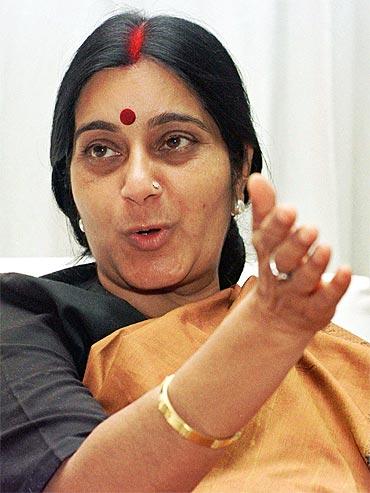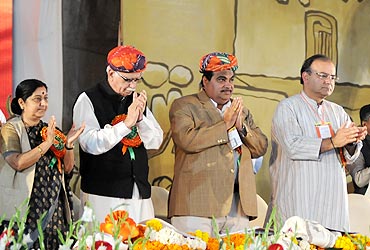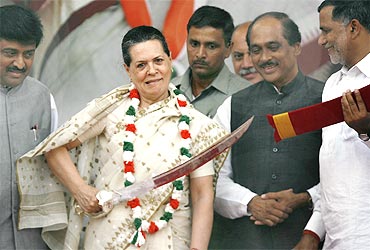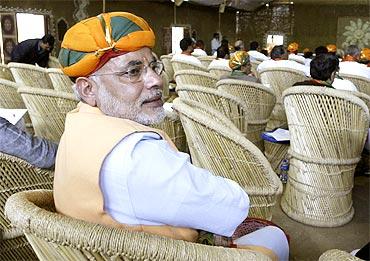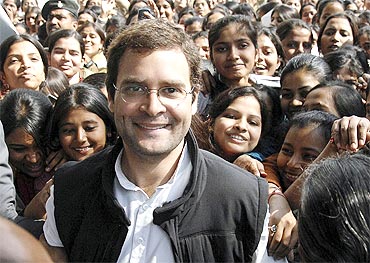 | « Back to article | Print this article |
'We have to pick up people's issues within and outside Parliament'
Though both she and Arun Jaitley are called leaders of opposition, she of the Lok Sabha and he of the Rajya Sabha, enjoying equal status, she enjoys a ranking a notch higher because as the leader in the Lok Sabha she is also called to perform certain functions like meeting visiting dignitaries.
She called on Bangladesh Prime Minister Sheikh Hasina who was recently on a visit to India and from all accounts, they enjoy a special rapport. Sushma took a cream-coloured silk sari for the Bangladesh leader, knowing that Hasina was partial to that colour. And Hasina presented her with a green Jamdani sari, with yellow motifs, she had herself selected. Sushma enthusiastically brought out the sari to show this correspondent.
Known for her oratory, Sushma Swaraj had first made a mark while campaigning in the 1977 elections after the Emergency was lifted. This correspondent remembers how at meetings she would start off by asking the village women gathered at her meetings whether anyone in the village was named Kaushalya or Sumitra. Invariably hands would go up in affirmation. Then she would ask whether anyone was named Kaikayi. The answer was always a "no". She would then urge the women to think why nobody named their children Kaikeyi. In a reference to Indira Gandhi, she would explain, "Because to enthrone her son, she banished another's son." And heads would nod comprehendingly.
Since 1977 Sushma Swaraj has covered a long distance, emerging today as possibly the best political orator in the country and a prime ministerial possible in the future.
She spoke to Neerja Chowdhury on a host of subjects, from the performance of the prime minister and the United Progressive Alliance government to rating the BJP's chief ministers, from how she saw her role as Leader of Opposition to her recent meeting with Sonia Gandhi who she had fought against at Bellary.
How do you see your role as LoP?
It is not very different from my earlier responsibility. As deputy leader, I was given full responsibility of managing the house that leader fulfils. Today also, the guidance of Advaniji is there -- he is chairman of the parliamentary party.
There are some new things I want to do. We are the main opposition but we have no members of Parliament from certain states. If the issues of those states are not raised in Parliament, it would reflect on our party. I have decided that before every session either I would go to some of these states or send my deputies so that we can give voice to the problems of the people there.
For example, the BJP has no MPs from Tamil Nadu or Andhra Pradesh but in the last session we took up both the issues, the Sri Lankan Tamils and of Telengana, strongly.
Secondly, we have a big human resource in our 116 MPs in the Lok Sabha, and we have to develop this. So far things have been left to their self initiative, there is no institutional mechanism for their development. We are now dealing with complex global issues and I would like 4-5 of our members to be readied on each of these subjects so that they become spokespersons on these issues, be it WTO, climate change and environment, internal security, or foreign policy.
We have asked for MPs to express their area of interest in which they would like to acquire expertise and I have also been in touch with the Shyama Prasad Mookerji Foundation and our various cells to provide us experts for this purpose. This will also go to improve our supplementaries in question hour and our performance in the standing committees. I would like a balanced group to be readied of younger MPs and seniors, and fortunately many of our seniors have been elected to the Lok Sabha this time.
How do you see your role at the wider level, outside of Parliament?
What is our shortcoming today? We are not seen as an alternative to the Congress. My aim is to project that the BJP is not only an alternative but a better alternative to the Congress. Who knows, elections may take place before 2014, they may take place in 2012. We have to pick up people's issues within and outside Parliament and give a voice to their pain and problems and come across as a party which understands this.
It is being said that you were appointed as LoP, not elected, and that in some ways takes away from the legitimacy of the post?
Not at all. Both ways can be adopted. The appointing authority in this case (Advani) was authorised to appoint the LoP and he drew his authority from his election (as chairperson of the parliamentary party). For example, Sonia Gandhi was authorised to select the leaders of both houses.
'We take party decisions together'
For Arun and me we look after the two houses and therefore the operations are different. Like, I can't decide the day to day things for the Rajya Sabha.
As for the party, as members of the parliamentary board and the core group, together all three of us know that `party ko kharha karna hai'. There is no compartmentalisation, we take the party decisions together.
Gadkari showed pragmatism in his first major political decision as party chief when he decided to back Shibu Soren in Jharkhand, in a U-turn, for the party had been sharply critical of Soren before the elections?
The parliamentary board met and Gadkari asked each person individually for his/her views, and the consensus emerged that to stop the Congress we should back Soren. He (Gadkari) did not take this decision alone.
Did the Rashtriya Swayamsevak Sangh go along with it?
The organisation mantri was there and he reflected the Sangh's view. It was also felt that there were large scale conversions (in Jharkhand) and Soren was opposed to them. There is no question of pragmatic or not, it is the decision of the party.
How do you see Advani's role now?
It will be the role of a mentor. As chairman of the parliamentary party, he will preside over the Tuesday meetings (of the parliamentary party) and other joint (party) meetings of both houses. The party will continue to benefit from the vast experience he has.
There was some talk that he was planning to lead another Rath Yatra?
Apna koi agenda lekar nahin jayenge. Advaniji never said anything like that. He never talked of a rath yatra as such. Everyone in the party will work under his guidance.
What would the party want him to do?
It is not what the party would like him to do, the party's decisions would be taken under his margdarshan. He is a part and parcel of the party. At 3-4 meetings we held recently, it was Arun (Jaitley) and I and Gadkari and Advanji who were there.
You called on Bangladesh Prime Minister Sheikh Hasina recently. How did that go?
I had met her twice before, the first time at the SAARC telecom ministers' conference in Dhaka. We established a rapport at that first meeting itself. The second time was when she had come to India as PM. This time also she was very warm. She came out of the room to receive me and hugged me warmly.
What did you talk about?
We talked about the empowerment of women in this continent. How, unlike in the West, where it was more difficult for women to become president or prime minister, here in South Asia we had had several women as prime minister. There was Indira Gandhi, Sirimavo Bandaranaike, Chandrika Kumaratunge, Sheikh Hasina.
In our country, at the moment, I said, the President, Lok Sabha Speaker, Leader of the Opposition and the chairperson of the ruling alliance were all women.
I also said when we went to international conferences, now the sariwala brigade could be identified distinctively as women who were empowered, women from India, Pakistan, Bangladesh and Nepal.
She said initially people used to doubt whether women would be able to manage things, but now this was changing. She expressed concern about the low literacy rate in Bangladesh and how they had made education free till the BA level.
I told her I had brought a sari for her. It was a south Indian sari, cream-coloured with a grey border. I knew cream is her favourite colour. She gave me a Jamdani green sari with yellow bootis, it is very beautiful. (She rang for an assistant and asked him to bring the sari out to show me). A bhalo Jamdani.
Dipu Moni (Bangladesh foreign minister) told me that she (Sheikh Hasina) stood there and said to specially select it for Sushma. I remarked that our baatcheet (as women) could not be complete without talk of saris. Our meeting was very personal and warm.'Sonia Gandhi has not spoken even once in 15th Lok Sabha'
If it is right to have the post of the NSA, then his role should be defined very clearly. We have recently seen tension and a tug of war between the home minister and the NSA. Sometimes they have spoken in very different voices, and there has been confusion and the government has been in a bad light. The confusion comes if the NSA is seen above the home minister because he was under the prime minister.
The home ministry's role should be focused. There are so many items under it today, it has to look after even official languages. There should be a minister looking after internal security and the remaining things should go under another ministry. Things like official languages can be looked after by the human resources development ministry.
So you would be for bifurcating the home ministry, as indicated by P Chidambaram?
This thinking -- what Chidambaram is saying today -- had started during the NDA regime, though it did not come to be discussed outside the government.
Internal security needs a more focused attention. The idea belongs to us. I am in favour of bifurcating the home ministry.
How do you see the PM's performance in UPA II?
This government is not cohesive. Earlier, the norm was to take a decision and then to announce it. Now what they are doing is to announce the decision first, before it is taken. When there is reaction, they say they will think about it. Then they set up a GoM and put the matter in cold storage. Perhaps there was pressure of showing something in the first 100 days.
But this is happening everywhere, whether it is Kapil Sibal's decision to dispense with class X exams or have the foreign universities come in, or to have a minister tweeting on external affairs and the senior minister explain to him why he should keep quiet or who is the boss. External Affairs is such a delicate ministry but they have made things so halka. It has become a joke.
Take rising prices. People are agonised over it. But you have the agriculture minister make the remark that he is not an astrologer to know when the prices will come down. Are prices going up because of bure graha (bad constellation of planets) or because of the wrong policies of the government?
It is a picture of a non-serious government. Somewhere you find a common thread of arrogance through all these statements that say just because we have won, we can do what we want.
But the opposition, particularly your party, has not been able to get its act together?
We put the government in the dock during the last two sessions of Parliament. We have decided to have a national campaign against rising prices from February 1-15 in every state. We will not let the government off the hook in the Budget session.
How is your relationship with Sonia Gandhi now?
It is good. When I became LoP I went to meet three people in the Congress -- Prime Minister Manmohan Singh, Leader of the Lok Sabha Pranab Mukherji and Sonia Gandhi, chairperson of the ruling alliance.
It was a very good meeting with her. She started the conversation in Hindi, and kept it going in Hindi. She chose to speak in Hindi. When as parliamentary affairs minister I had gone to see her, she had spoken in English. We spoke of our children and what they were doing. It was a personal, warm conversation.
Somebody asked me afterwards whether I regretted what I said about her earlier (in 2004). I said no, that was my patriotic duty (to stop her becoming PM). What I was doing now was my democratic duty as LoP. But our relations are cordial.
How do you see her performance?
She has not spoken even once in the 15th Lok Sabha.
Do you think she is less hands-on now?
She is chairperson of the ruling alliance. But now she does not have so many jhagras to deal with. She had more of a role in 2004. There is no coordination committee this time. We had hoped that as a woman she would tell the government to do more on mehngai.'To wash off his communal image is Modi's challenge'
The RSS neither thinks of a takeover nor will they do it. The BJP is a political organisation. There is salah mashwara with the RSS. The Sangh doesn't ever micromanage. It does not interfere in the day to day management of the party. There is no need to bring any change in this (arrangement).
It is being said that the RSS wants to place its people, pracharaks, in key positions all over the organisation?
This is wrong. It is not true.
Will you accept Samajwadi Party's Amar Singh in the BJP?
No way. But look at it from his point of view, he will say I never applied. No point answering a hypothetical question.
How would you rate the BJP chief ministers today?
Shivraj Chouhan has given pro-poor governance, the BJP is seen as a party of the poor today. He is seen as a sensitive CM.
And the minus or the challenge before him?
The challenge is of delivery. He has to ensure that what he wants to do reaches down below.
What about Narendra Modi?
He has become a role model of development. People feel his programmes are innovative, his delivery system is effective, he has a grip over the administration.
His challenge is that without any reason a communal image has got stuck to him which he is trying to get rid of. To wash it off fully is his challenge.
Yeddyurappa has given a pro-farmer governance, he understands the pain of the farmer. His challenge is to keep his flock together.
Dhumal is development oriented and has a good image. His challenge is to maintain his tempo.
Raman Singh is also pro-poor and known as chawal baba, and his schemes have clicked. He has to ensure that people do not become lazy and dependent on doles.
Nishank has given the image of running a good administration He became CM at a difficult time and is having to work very hard. His challenge is to show that he is pro-workers.
From what you are saying, you are admitting that development, good governance and the bread and butter issues are bringing you dividends. Where does it leave your emotive issues?
Our three core issues are not state-related. We never ignored vikas in the NDA either, whether it was infrastructure, telecom or connectivity, or the linking of the rivers or the Golden Quadrilateral or the Antyodaya Yojana. It is the people-based development on which the UPA I and UPA II are based. But we are also committed to desh bhakti ke mudde like the bills against cow slaughter or conversion or strengthening the anti-terror laws.'Rahul Gandhi will have to understand the country'
He is going to the dehat, it is good grooming, if he wants to play a proactive role in politics. He will have to understand the country. It is a good thing he has taken up.
Do you see him as a future PM?
It is up to the Congress to decide whether it wants to project him as PM, and for the electorate to decide.
There were reports that the Gandhi in your party, Varun, may be given an important post?
There is no discussion in the party on this. If Varun is given a position in the party, I don't think it will be to counter Rahul. It will be on merit.
Parties are already preparing for elections in Uttar Pradesh, slated for 2012, which are expected to be a political milestone. What are the prospects for your party which has lost a lot of ground?
After the BJP president has constituted the national executive, he will constitute the UP team. UP needs dynamic people who can move around and give voice to people's pain and their aspirations. I feel the BJP president will choose such a leadership.
You are known for wearing specific colours on specific days
There is no religious angle to this. It is for better wardrobe management. It is easier to mange it. I have to select from a fewer saris on a specific day.
For instance Som (Monday) is guided by Chandrima, or moon, and the stone is pearl, so the colour is white or cream. For Tuesday the gem is coral and colour, the orange family. On Wednesday it is emerald and the colour green. For Thursday it is topaz and therefore yellows. Friday is diamond and it means the mauves and the greys. Saturday is sapphire and the blues and blacks come under it. And Sunday is ruby and the red and browns. I find this way the identification of the clothing to wear is easier, so is purchase. Even my maid knows what to pack.
What is your favourite colour?
Maroon is my favourite colour.
Is your daughter going to follow in your footsteps?
She goes to court and wears black. She is practising law and wants to do well in her profession.
And politics?
She talks about it. She does not abhor politics. When we sit together we discuss politics. After all, we are thinking citizens.